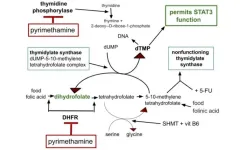(Press-News.org) In writing a good online dating profile, the average love-seeker is likely to fill it up with all the appealing qualities and interests that make them special. They paraglide and do hot yoga on the weekends; enjoy Riesling on the beach or seeing indie bands in basements; are a Libra with Scorpio rising; or have a dog or three kids or an iguana. There’s one thing they routinely leave out, however: what they want to know about their potential partner.
Yet, that detail might the most important thing to include, according to research by Haas Associate Professor Juliana Schroeder.
“People want to be known, so they’re looking for partners who will know them and support them,” she says. “But because other people also want to be known, they end up writing these not-super-appealing profiles when trying to attract partners.”
In her recent paper “Feeling Known Predicts Relationship Satisfaction,” Schroeder argues the phenomenon occurs not only with romantic couples, but in all manner of interpersonal relationships, including friends, neighbors, family members, work colleagues, and casual acquaintances. In each case, people were more satisfied when they felt like they were known, rather than when they felt like they knew the other person, according to a series of experiments Schroeder carried out with co-author Ayelet Fishbach of the University of Chicago Booth School of Business.
“Of course, people say they want to know their relationship partner and support their partner,” says Schroeder, Harold Furst Chair in Management Philosophy & Values at Berkeley Haas. “But that’s not actually the thing that makes them happiest in their relationships. People feel happier in relationships where they feel like they are being supported—and for that, they have to be known.”
Relationship satisfaction
Fishbach noted that the research project started a decade ago after she and Schroeder discovered that patients want their physicians to not have emotions of their own so that they can fully attend to them and feel their pain—a phenomenon they called the empty vessel effect. “We wondered whether this is a more general phenomenon whereby people are attuned to what others know about them more than what they know about others,” Fishbach says.
In an initial set of experiments, published in the Journal of Experimental Social Psychology, the researchers asked participants to rate how well they believed they knew a family member, partner, or friend, compared to how well they believed they were known—and then to rate their relationship satisfaction on a scale of 1 to 7. Interestingly, people routinely thought they knew the other person better than the other person knew them. This effect has been called the illusion of asymmetric insight. “People think they are unique and special and have a lot of complexity to them, so other people just don’t know their true self,” Schroeder says. “Whereas once they know one thing about the other person, they’re like ‘I know you. Done.’”
Perhaps because it’s so rare to feel that anyone really knows us, people value it more highly in their relationships. In fact, the degree to which they knew the other person mattered less in how they felt about the relationship compared to the degree to which they felt they were known, regardless of how they felt about the overall quality of the relationship.
In another study, the researchers presented participants with one of two scenarios in which they ran into an acquaintance at a party who either forgot their name or whose name they forgot. Participants had different reactions to the two scenarios – as Schroeder summarizes: “If you forget their name, it’s not great for the relationship, but if they forget your name, it’s much worse -- the relationship is over,” Schroeder says.
What's missing from online dating profiles
Carrying these concepts over to dating profiles, Schroeder and Fishbach enlisted a team of research assistants to examine profiles from dating sites Match.com and Coffee Meets Bagel. Based on statements in the profiles, they rated more than 50% of the writers as wanting to be known by a potential partner, while only about 20% expressed a desire to know their potential partner.
They then asked several dozen online participants to write their own profiles, either emphasizing being known or getting to know the other person. Finally, they asked more than 250 other people to rate these profiles on a scale of 1 to 7, according to how much they found them appealing and how much they would potentially want to contact them. In keeping with the rest of their findings, Schroeder and Fishbach found that the raters preferred those profile-writers who emphasized wanting to know the other person.
Those findings could be instructive for someone trying to make themselves as appealing as possible on a dating site. “What they want to be doing is saying, ‘I really care about you, and I’m going to get to know you and be there for you and listen to you and be a great partner,” Schroeder says.
In all of the studies, there was only one type of relationship in which people did not care about being known: a parent’s relationship with their child. “In fact, we found an effect going in the opposite direction,” Schroeder says. “The thing that predicts relationship satisfaction is not how well they think their child knows them, it’s how well they know their child.” That makes sense, she adds, lending credence to the idea that the phenomenon is essentially about support. “It’s the one relationship where it’s very clear the parent needs to be supporting the child.”
The next step for Schroeder and Fishbach is to consider how people might shift their focus towards using their knowledge of other people to make them feel known in a genuine way. In a workplace context, for example, it’s possible that feeling known might not only improve relationship satisfaction with colleagues, but overall job satisfaction as well. “To develop relationships with work colleagues, you might think not just about personal knowledge, but also what are people’s habits and how they like to work,” Schoeder says. “While this was beyond the scope of our study, it’s possible that stronger workplace relationships could ultimately make a difference in terms of people’s satisfaction with their jobs.”
END
Research reveals the key to an irresistible online dating profile
Feeling known predicts relationship satisfaction
2024-02-09
ELSE PRESS RELEASES FROM THIS DATE:
Surprisingly vibrant colour of 12-million-year-old snail shells
2024-02-09
Snail shells are often colourful and strikingly patterned. This is due to pigments that are produced in special cells of the snail and stored in the shell in varying concentrations. Fossil shells, on the other hand, are usually pale and inconspicuous because the pigments are very sensitive and have already decomposed. Residues of ancient colour patterns are therefore very rare. This makes this new discovery by researchers from the University of Göttingen and the Natural History Museum Vienna (NHMW) all the more astonishing: they found pigments in ...
In the Cerrado, crop diversification has beneficial effects on wildlife and reduces the presence of boars
2024-02-09
There are no substitutes for native vegetation, but replacing large areas of monoculture with diversified crops in places where agricultural activities are widespread can have beneficial effects on the mammals that still inhabit the region.
This is one of the conclusions of a study conducted by researchers at the University of São Paulo (USP) supported by FAPESP. They focused on the northeast of São Paulo state, where the predominant biome is the Cerrado (Brazilian savanna). The region is one of the nation’s agribusiness centers.
An article on the study is published in the Journal of Applied Ecology. The study showed that ...
How electron spectroscopy measures exciton “holes”
2024-02-09
Semiconductors are ubiquitous in modern technology, working to either enable or prevent the flow of electricity. In order to understand the potential of two-dimensional semiconductors for future computer and photovoltaic technologies, researchers from the Universities of Göttingen, Marburg and Cambridge investigated the bond that builds between the electrons and holes contained in these materials. By using a special method to break up the bond between electrons and holes, they were able to gain a ...
IPIAD: an augmentation to standard treatment of PDAC using five repurposed drugs
2024-02-09
“This paper presents the rationale for adding five already approved and marketed generic drugs from general medical practice to the current standard current first line chemotherapy for pancreatic ductal adenocarcinoma (PDAC).”
BUFFALO, NY- February 9, 2024 – A new research perspective was published in Oncoscience (Volume 11) on February 7, 2024, entitled, “IPIAD- an augmentation regimen added to standard treatment of pancreatic ductal adenocarcinoma using already-marketed repurposed drugs irbesartan, pyrimethamine, itraconazole, azithromycin, and dapsone.”
In this new paper, researcher Richard E. Kast from IIAIGC Study Center presents the ...
UT Health San Antonio School of Dentistry opens dental clinic for special-needs children, adults
2024-02-09
SAN ANTONIO, Feb. 9, 2024 – The UT Health San Antonio School of Dentistry has opened a special-care dental clinic, the first of its kind in an academic setting in South Texas that will serve people of all ages with intellectual, developmental, cognitive or physical disabilities.
With spacious, specially designed treatment rooms featuring adjustable sound and lighting and even a “Zen Den” multi-sensory room to help reduce anxiety, the Phil and Karen Hunke Special Care Clinic occupies approximately ...
This ultrasound sticker senses changing stiffness of deep internal organs
2024-02-09
MIT engineers have developed a small ultrasound sticker that can monitor the stiffness of organs deep inside the body. The sticker, about the size of a postage stamp, can be worn on the skin and is designed to pick up on signs of disease, such as liver and kidney failure and the progression of solid tumors.
In an open-access study that will appear in Science Advances, the team reports that the sensor can send sound waves through the skin and into the body, where the waves reflect off internal organs and back out to the sticker. The pattern of the reflected waves can be read as ...
Yale joins the ‘Snowball’ fight over global deep freeze periods
2024-02-09
New Haven, Conn. — A Yale-led research team has picked a side in the “Snowball Earth” debate over the possible cause of planet-wide deep freeze events that occurred in the distant past.
According to a new study, these so-called “Snowball” Earth periods, in which the planet’s surface was covered in ice for thousands or even millions of years, could have been triggered abruptly by large asteroids that slammed into the Earth.
The findings, detailed in the journal Science Advances, may answer a question ...
Sensors made from ‘frozen smoke’ can detect toxic formaldehyde in homes and offices
2024-02-09
Researchers have developed a sensor made from ‘frozen smoke’ that uses artificial intelligence techniques to detect formaldehyde in real time at concentrations as low as eight parts per billion, far beyond the sensitivity of most indoor air quality sensors.
The researchers, from the University of Cambridge, developed sensors made from highly porous materials known as aerogels. By precisely engineering the shape of the holes in the aerogels, the sensors were able to detect the fingerprint of formaldehyde, a common indoor air pollutant, at room temperature.
The proof-of-concept sensors, which require minimal power, could be adapted to detect ...
University Hospitals now offering FDA-approved medication for treatment of Alzheimer’s disease
2024-02-09
CLEVELAND—University Hospitals (UH) Brain Health & Memory Center is now treating patients with LEQEMBI® (lecanemab), a Food and Drug Administration-approved medication for the treatment of Alzheimer’s disease.
“Those with Alzheimer’s disease often have an abnormal buildup of plaques in their brain that contain a protein called beta-amyloid,” said Charles J. Duffy, MD, PhD, neurologist and Director of the Brain Health & Memory Center within the UH Neurological Institute. “Lecanemab ...
Unlocking quantum precision: Expanded superconducting strips for enhanced photon-counting accuracy
2024-02-09
Using single photons as qubits has become a prominent strategy in quantum information technology. Accurately determining the number of photons is crucial in various quantum systems, including quantum computation, quantum communication, and quantum metrology. Photon-number-resolving detectors (PNRDs) play a vital role in achieving this accuracy and have two main performance indicators: resolving fidelity, which measures the probability of accurately recording the number of incident photons, and dynamic range, which describes the maximum resolvable photon number.
Superconducting nanostrip single-photon detectors (SNSPDs) are considered the leading ...
LAST 30 PRESS RELEASES:
Toxic exposure creates epigenetic disease risk over 20 generations
More time spent on social media linked to steroid use intentions among boys and men
New study suggests a “kick it while it’s down” approach to cancer treatment could improve cure rates
Milken Institute, Ann Theodore Foundation launch new grant to support clinical trial for potential sarcoidosis treatment
New strategies boost effectiveness of CAR-NK therapy against cancer
Study: Adolescent cannabis use linked to doubling risk of psychotic and bipolar disorders
Invisible harms: drug-related deaths spike after hurricanes and tropical storms
Adolescent cannabis use and risk of psychotic, bipolar, depressive, and anxiety disorders
Anxiety, depression, and care barriers in adults with intellectual and developmental disabilities
Study: Anxiety, gloom often accompany intellectual deficits
Massage Therapy Foundation awards $300,000 research grant to the University of Denver
Gastrointestinal toxicity linked to targeted cancer therapies in the United States
Countdown to the Bial Award in Biomedicine 2025
Blood marker from dementia research could help track aging across the animal world
Birds change altitude to survive epic journeys across deserts and seas
Here's why you need a backup for the map on your phone
ACS Central Science | Researchers from Insilico Medicine and Lilly publish foundational vision for fully autonomous “Prompt-to-Drug” pharmaceutical R&D
Increasing the number of coronary interventions in patients with acute myocardial infarction does not appear to reduce death rates
Tackling uplift resistance in tall infrastructures sustainably
Novel wireless origami-inspired smart cushioning device for safer logistics
Hidden genetic mismatch, which triples the risk of a life-threatening immune attack after cord blood transplantation
Physical function is a crucial predictor of survival after heart failure
Striking genomic architecture discovered in embryonic reproductive cells before they start developing into sperm and eggs
Screening improves early detection of colorectal cancer
New data on spontaneous coronary artery dissection (SCAD) – a common cause of heart attacks in younger women
How root growth is stimulated by nitrate: Researchers decipher signalling chain
Scientists reveal our best- and worst-case scenarios for a warming Antarctica
Cleaner fish show intelligence typical of mammals
AABNet and partners launch landmark guide on the conservation of African livestock genetic resources and sustainable breeding strategies
Produce hydrogen and oxygen simultaneously from a single atom! Achieve carbon neutrality with an 'All-in-one' single-atom water electrolysis catalyst
[Press-News.org] Research reveals the key to an irresistible online dating profileFeeling known predicts relationship satisfaction





